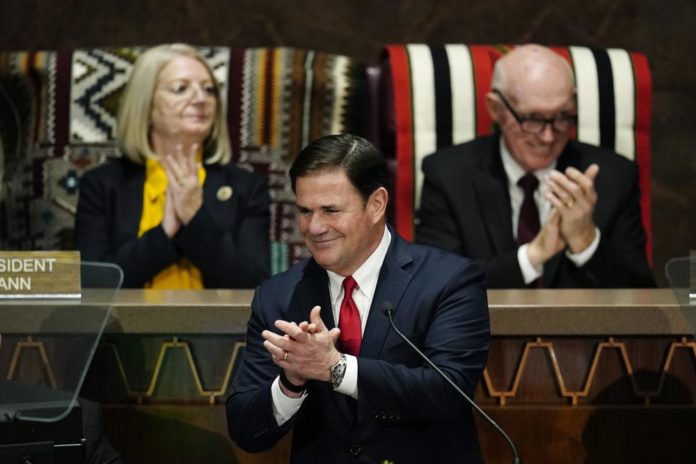
Arizona Gov. Doug Ducey on Tuesday signed into law his eighth and final state budget, an $18 billion spending plan that uses a record surplus to invest in education and infrastructure while lowering state debt and preparing for an economic downturn.
The massive spending plan marks a stark change in fortunes for a governor who took office in 2015 amid historic deficits that forced deep cuts to public services. It passed the House and Senate last week with overwhelming bipartisan support for the first time in years.
With a surplus topping $5 billion, Ducey and lawmakers approved an array of new spending and debt reduction.
That includes $544 million for border security, roughly half of it for a wall, and $1 billion for highway construction, including widening Interstate 10 north of Casa Grande. State employees will get a raise, many for the first time in a decade. Hundreds of millions are set aside for water infrastructure or conservation as the state faces prolonged drought.
The budget also makes a $1.1 billion deposit into the pension fund for public safety and corrections officers, paying off the state’s unfunded liability for future retirement benefits and saving millions down the road. And it puts another $425 million in the rainy day fund to help the state grapple with a potential recession, bringing the account’s balance to $1.4 billion.
It also eliminates the state equalization tax, a property tax for education, and backfills it with $330 million from the general fund.
“We’re making fiscally responsible decisions and targeted commitments that will leave a legacy long after this administration,” Ducey said in a statement.
The plan includes a handful of small, targeted tax cuts for farm machines and private planes but no large-scale reductions, in keeping with Ducey’s pledge when he took office to cut taxes every year of his term. Republicans last year enacted a $1.7 billion income tax cut that is still phasing in.
GOP and Democratic leaders agreed to increase school spending by more than $1 billion, including automatic inflationary increases. Their agreement also boosts university funding.
Ducey used his line-item veto power for the first time to strike $3.6 million for hyperbaric oxygen therapy for veterans. He said the expenditure, requested by Republican Sen. Wendy Rogers, “has little support from the public and veteran community.”
Hyperbaric oxygen chambers are used to treat burn patients and for other wound treatment, carbon monoxide poisoning, and some other medical conditions. It’s been touted as helpful for treating PTSD, but the evidence is not clear that it is effective, according to a 2021 review done for the Department of Veterans Affairs.
The chambers are large enough to hold from one to several people and are pressurized with 100% oxygen, which raises the level in the blood.
The major growth in spending is a far cry from the situation when took office at a fiscal low point, with a $1 billion deficit and swelling debt.
As the economy and the state’s finances recovered, Ducey and the GOP-controlled Legislature repeatedly cut taxes, slowing the growth in state revenue. It all came to a head in 2018, when thousands of teachers walked out of their classrooms and marched on the Capitol demanding an end to tax cuts after a decade of disinvestment in schools.
Ducey and lawmakers ultimately agreed to increase school funding by enough to raise teacher pay by 20% over three years. But other school funding streams — including building renewal and a fund used to pay for tangible goods like textbooks and computers — for years fell far short of their trajectory before the Great Recession.
Republished with the permission of The Associated Press.













